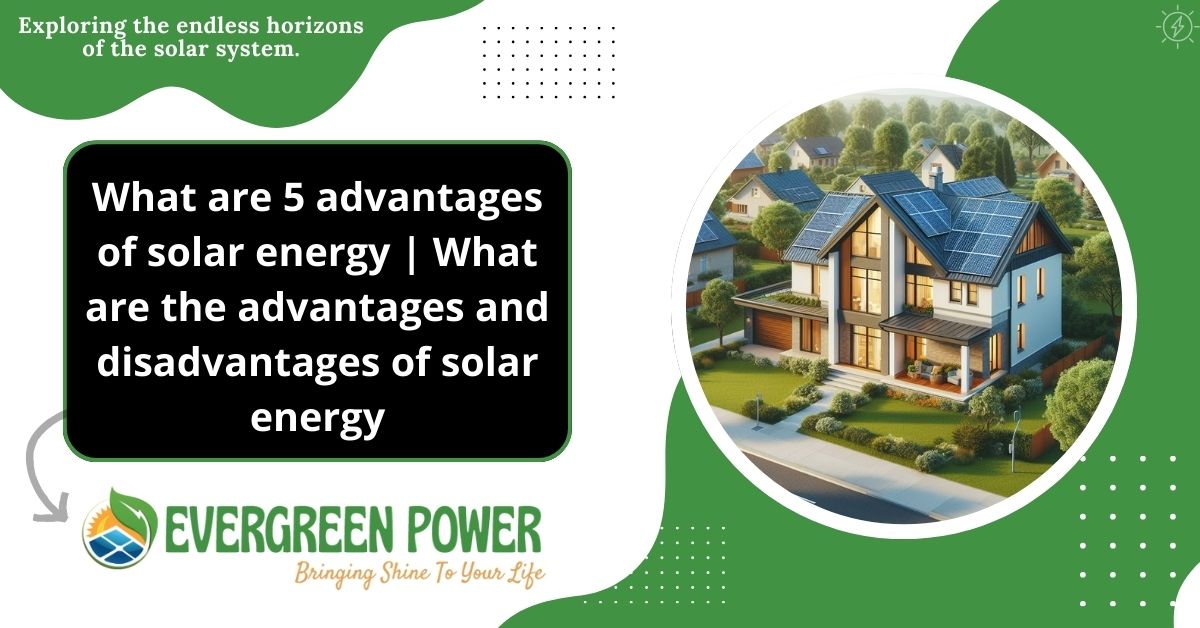Discover the advantages and disadvantages of solar energy, including its impact on electricity bills, environmental benefits, and factors to consider before installation. Get answers to common questions about solar panels and explore tips for maximizing your solar energy investment.
Introduction:
In an age where sustainability and affordability are at the forefront of energy discussions, solar power has emerged as a leading contender. With the availability of solar panel grants and increasingly competitive prices, more families are turning to solar energy as their primary source of power. Yet, like any energy source, solar power comes with its own set of advantages and disadvantages. In this comprehensive guide, we’ll explore both sides of the coin, shedding light on the benefits and challenges of harnessing the sun’s energy.
| Advantages of Solar Energy | Disadvantages of Solar Energy |
| 1. Renewable and reduces carbon emissions. | 1. High initial installation costs. |
| 2. Reduces electricity bills. | 2. Expensive solar energy storage. |
| 3. Earns money through Solar Renewable Energy Credits. | 3. Not suitable for every roof type. |
| 4. Increases home value. | 4. Dependence on sunlight for electricity generation. |
| 5. Low maintenance costs. | 5. Community solar projects offer alternative options. |

Advantages of Solar Energy:
Renewable Energy Source:
At the core of solar energy’s appeal is its status as a renewable resource. Unlike finite fossil fuels, solar energy is inexhaustible as long as the sun continues to shine. This means that we can rely on solar power for the foreseeable future, making it a sustainable solution to our energy needs.
- Solar energy represents a virtually limitless source of power, offering a reliable and abundant energy supply that can be harnessed across the globe. Unlike fossil fuels, which are finite and subject to depletion, solar energy provides a constant and reliable source of power that can meet our energy needs for generations to come. With advancements in solar technology and infrastructure, we have the potential to tap into this vast resource and transition towards a more sustainable energy future.
Reduction in Electricity Bills:
One of the most immediate benefits of installing solar panels is the reduction in electricity bills. By generating your electricity from sunlight, you can significantly lower your dependence on traditional utility companies and even sell surplus energy back to the grid through programs like the Smart Export Guarantee (SEG), providing an additional source of income.
- The financial benefits of solar energy extend beyond the initial cost savings on electricity bills. By investing in solar panels, homeowners and businesses can protect themselves against future energy price increases, providing long-term stability and savings. Additionally, solar energy offers a hedge against inflation, as the cost of sunlight is free and abundant, unlike fossil fuels, which are subject to price volatility and geopolitical tensions.
Diverse Applications:
Solar energy offers a versatile solution to various energy needs. Whether you’re looking to power your home, heat water, or even fuel satellites in space, solar energy can be adapted to a wide range of applications. Its flexibility makes it a valuable resource for both residential and commercial use.
- The versatility of solar energy extends beyond traditional electricity generation. Solar thermal systems can be used to heat water for residential and commercial purposes, reducing the reliance on fossil fuel-based water heaters and lowering energy costs. Additionally, solar energy can be integrated into building materials such as windows and roofing tiles, offering dual functionality and further enhancing energy efficiency.
Low Maintenance Costs:
Unlike traditional power sources that require regular maintenance and upkeep, solar energy systems are relatively low maintenance. With no moving parts and durable materials, solar panels typically only require occasional cleaning to ensure optimal performance. This translates to long-term cost savings and minimal hassle for homeowners and businesses alike.
- The minimal maintenance requirements of solar panels make them an attractive option for homeowners and businesses looking to reduce their environmental footprint and energy costs. With routine inspections and occasional cleaning, solar panels can operate efficiently for decades, requiring little to no additional investment in maintenance or repairs. This stands in stark contrast to traditional energy sources, which often require costly and time-consuming maintenance to ensure reliable operation.
Technological Advancements:
The field of solar technology is constantly evolving, with ongoing advancements leading to increased efficiency and affordability. Innovations in quantum physics and nanotechnology hold the promise of further enhancing the effectiveness of solar panels, making them even more accessible and efficient for consumers.
- The pace of technological innovation in the solar industry is accelerating, driving down costs and improving performance across the board. From advancements in solar panel efficiency to breakthroughs in energy storage and grid integration, solar technology is rapidly evolving to meet the growing demand for clean and sustainable energy solutions. As research and development continue to push the boundaries of what’s possible, we can expect to see even greater gains in efficiency, affordability, and reliability in the coming years.
Disadvantages of Solar Energy:
Initial Cost:
While the long-term savings of solar energy are undeniable, the initial cost of purchasing and installing solar panels can be a barrier for some consumers. However, it’s important to note that prices have been steadily declining. With the availability of financing options and incentives, solar energy is becoming increasingly affordable for homeowners and businesses alike.
- The upfront cost of installing solar panels can vary depending on factors such as system size, location, and installation complexity. While the initial investment may seem daunting, it’s important to consider the long-term benefits and potential return on investment in solar energy. With federal and state incentives, tax credits, and financing options available, the financial barriers to solar adoption are lower than ever before, making solar energy accessible to a wider range of consumers.
Weather Dependence:
Solar energy generation is dependent on sunlight, meaning its effectiveness can be influenced by weather conditions. Cloudy or rainy days can reduce the amount of energy generated by solar panels, potentially impacting energy production during these periods. Additionally, solar energy cannot be collected at night, necessitating the use of storage solutions or grid connections for uninterrupted power supply.
- While solar panels can still generate electricity on cloudy or overcast days, their efficiency may be reduced compared to sunny conditions. This variability in energy production can pose challenges for grid operators and energy planners, who must balance supply and demand to ensure grid stability and reliability. However, advancements in energy storage technology, such as batteries and pumped hydro storage, are helping to mitigate the impact of weather variability on solar energy systems, providing a more reliable and resilient energy supply.
Solar Energy Storage Costs:
While solar energy can be stored in batteries for later use, the cost of solar energy storage systems can be prohibitive for some consumers. Off-grid solar systems that rely on battery storage for nighttime or cloudy day energy consumption can require significant upfront investment, although prices are expected to decrease as technology advances and economies of scale are realized.
- The cost of solar energy storage has historically been a barrier to widespread adoption, particularly for residential consumers. However, as battery technology continues to improve and production costs decline, the economics of solar energy storage are becoming more favorable. Additionally, innovations in grid integration and demand-side management are enabling more efficient use of solar energy, reducing the need for expensive storage solutions.
Space Requirements:
To generate sufficient electricity, solar panels require adequate space to capture sunlight effectively. This can be a challenge for properties with limited roof space or shading issues. Additionally, the installation of ground-mounted solar panels may not be feasible for all homeowners due to space constraints or local regulations.
- The space requirements of solar panels can vary depending on system size, panel orientation, and shading conditions. While rooftop solar installations are the most common approach for residential applications, ground-mounted systems offer an alternative for properties with limited roof space or shading issues. However, ground-mounted systems may require additional land and infrastructure, increasing the overall cost and complexity of the installation.

Environmental Impact:
While solar energy is considered a clean and sustainable energy source, the manufacturing and transportation processes associated with solar panels can still have environmental impacts. Toxic materials and hazardous products used in the production of solar photovoltaic systems can contribute to pollution, albeit to While the environmental impact of solar energy production is relatively low compared to fossil fuels, it is not entirely without consequences. The manufacturing process of solar panels involves the use of toxic materials such as lead, cadmium, and silicon, which can have negative environmental implications if not properly managed. Additionally, the transportation of solar panels and associated components can contribute to greenhouse gas emissions and air pollution, particularly if they are produced overseas and shipped long distances.
The Future is Bright with Solar
Imagine a world powered by clean, abundant energy. A world where your home lights up thanks to the sun, and your electricity bill shrinks alongside your carbon footprint. This isn’t science fiction – it’s the future we’re building with solar energy.
Solar energy isn’t just a feel-good alternative; it’s a powerful and practical solution to our energy needs. Here’s why the future of energy is undeniably bright with solar:
Powering a Sustainable Tomorrow: Unlike fossil fuels, a finite resource that pollutes our planet, solar energy is endlessly renewable. The sun’s rays will bathe our planet for billions of years to come, providing a clean and reliable energy source for generations.
Cost-Effective Brilliance: Solar technology is becoming increasingly affordable. With advancements in efficiency and falling installation costs, solar panels are a sound investment that pays off in the long run. Imagine slashing your electricity bills while generating clean energy – that’s the power of solar.
Energy Independence for All: Solar panels empower individuals and communities to generate their own electricity. This reduces reliance on traditional grids and fossil fuels, fostering energy independence. Whether you live in a bustling city or a remote location, solar offers the potential for self-sufficiency.
Innovation Illuminates the Path: The world of solar is constantly evolving. Researchers are developing next-generation panels with even higher efficiency, and advancements in energy storage solutions are addressing concerns about nighttime or cloudy days. The future of solar is brimming with innovation, promising an even brighter tomorrow.
A Brighter Future for Our Planet: Solar energy is a game-changer in the fight against climate change. By harnessing the sun’s power, we can significantly reduce our dependence on fossil fuels and the harmful emissions they create. Solar is a key player in building a cleaner, healthier planet for all.
Investing in Sunshine:
The future is bright with solar, and the time to invest in this sustainable technology is now. With government incentives, readily available information, and a growing number of reputable solar installation companies, going solar is easier than ever.
Take a step towards a brighter future – explore the possibilities of solar energy and join the movement for a clean, sustainable tomorrow. Let’s harness the power of the sun and illuminate the path to a brighter future, one sunbeam at a time.

FAQs about the advantages of solar energy
How do solar panels work?
Solar panels work by converting sunlight into electricity through the photovoltaic effect. When sunlight hits the solar cells within the panels, it excites electrons, creating an electric current. This direct current (DC) is then converted into alternating current (AC) by an inverter, which can be used to power electrical devices in homes and businesses.
What are the environmental benefits of solar energy?
Solar energy is a clean, renewable resource that produces no greenhouse gas emissions or air pollutants during operation. By reducing reliance on fossil fuels, solar power helps combat climate change and air pollution, preserving natural resources and ecosystems for future generations.
Are there any government incentives available for installing solar panels?
Yes, many governments offer incentives to encourage the adoption of solar energy. These incentives may include tax credits, rebates, grants, and net metering programs, which allow homeowners to sell excess energy back to the grid. Additionally, some regions offer Solar Renewable Energy Certificates (SRECs) or feed-in tariffs to further incentivize solar panel installation.
What factors should I consider before installing solar panels on my home?
Before installing solar panels, it’s important to assess your home’s solar potential, including its orientation, shading, and roof condition. You should also consider your energy needs, budget, available incentives, and local regulations. Consulting with a reputable solar installer can help you determine the best system size, financing options, and installation approach for your specific situation.
How long do solar panels last?
Most solar panels come with warranties ranging from 25 to 30 years, but they can last much longer with proper maintenance. While solar panels may experience a slight decrease in efficiency over time, advancements in technology and manufacturing processes have improved durability and longevity. Regular cleaning and inspection can help maximize the lifespan and performance of your solar panels.
Can solar panels work during power outages?
In most cases, grid-tied solar energy systems are designed to shut down automatically during power outages to prevent backfeeding electricity into the grid, which could endanger utility workers. However, with the addition of battery storage systems or backup generators, it’s possible to maintain power supply during outages. Off-grid solar systems, which operate independently of the grid, are also capable of providing electricity during blackouts.
Conclusion about advantages of solar energy
In conclusion, the advantages of solar energy far outweigh the disadvantages, making it a compelling option for sustainable energy production. From its renewable nature and cost-saving potential to its versatility and minimal environmental footprint, solar energy offers a path towards a cleaner, greener future for generations to come. While there are challenges to overcome, such as initial costs and weather dependence, ongoing advancements in technology and policy support are driving us toward a more sustainable energy landscape.
Visit our Site:
Welcome to EG Power Ltd – your go-to destination for solar solutions. With over five years of experience in solar and renewable energy, we’re dedicated to providing the most cost-effective panels on the market.
We prioritize environmental sensitivity and offer personalized solutions to meet your needs. Join us in saving the planet – contact us today!
Phone: 0300 1819060
Email: info@egpowerltd.com

